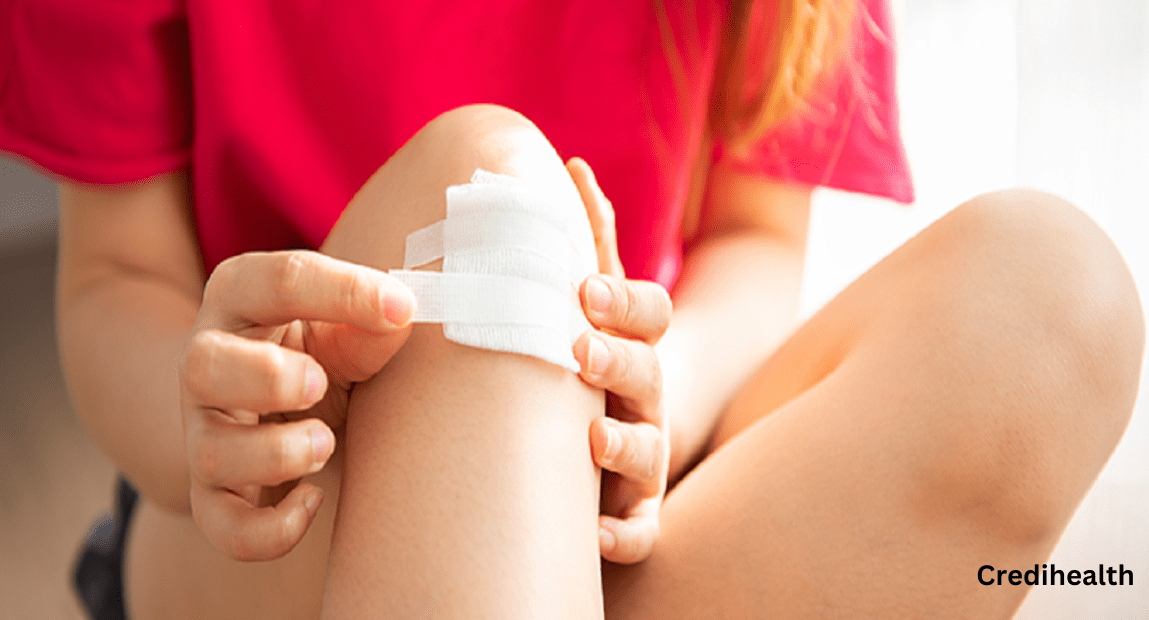Minor cuts and injuries are a household situation worldwide. If you are clumsy, the frequency of cutting yourself is way more. If you are careful, you are still human, and some slips of hands here and a bit of off-mindedness there will end up with you having a cut. It is not common to care for such injuries. We continue our day without allowing these mishaps to disrupt our regime. However, you should pay attention to these small and minor injuries too. We should be careful and tend to our wounds and cuts by following proper procedures. Tending to our minor injuries is the first step towards preventing a larger infection. This blog will describe different solutions on how to heal cuts faster.
Nutritional Methods to Heal a Cut Faster

Certain suggested nutritional supplements aid in healing open cuts. The scientific evidence that proves these properties needs to be more extensive. Seeking guidance from your healthcare professional is crucial before using herbal remedies or supplements, especially when planning for surgery. #1 Beta-carotene or Vitamin A: Vitamin A aids and supports the process of formation of healthy scar tissue. However, it remains vital that you determine the appropriate dosage after discussing it with your medical professional. Pregnant women, women looking to conceive, patients with liver disease, et cetera should avoid high doses of vitamin A. If you are considering taking it prior to surgery, it is advised that you consult with our doctor regarding the same. #2 Vitamin C: Vitamin C is primary in collagen synthesis. Collaterally, collagen synthesis is vital when it comes to the process of wound healing and tissue regeneration. It is generally safe for consumption; however, in case of diarrhea, it is recommended that you adjust your dosage. You should practice caution when it comes to interactions with other drugs and medications (viz., Chemotherapy drugs, estrogen, coumadin). #3 Vitamin E: Vitamin E is best known for its wound-healing properties. It is usually known to be applied on the cut topically after the open wound has healed, and new skin has formed. Burn healing is also one of its benefits. However, much higher doses are necessary for that. It is recommended that you consult with your doctor before you include vitamin E in your regime, especially if you are due to get a surgical procedure. There are chances that this vitamin will interact with certain medications and increase your risk of bleeding. This is especially a danger for those who take blood thinners regularly. #4 Zinc: Zinc plays a primary role in the stimulation of healing of cuts. You can apply It in the form of a cream. This helps in speeding up the wound recovery process. You must avoid applying zinc (in any form) directly on open wounds. It is important to seek advice from your doctor regarding zinc supplements and creams, as they may recommend adjusting your dosage accordingly. Very high doses of zinc have a risk of negatively impacting your immune system and also increase the risk of contracting certain cancers. #5 B complex vitamins: B1 and B5 vitamins, commonly known as the vitamin B complex, are believed to play a primary role in healing cuts and open wounds. Additionally, it also helps maintain overall skin health. The absence of vitamin B complex might even cause some complications in the healing process because it plays a primary role in several steps, including the linkage of collagens, the cell growth process, and providing a healthy oxygen supply. #6 Bromelain: Bromelain is a nutrient derived from pineapple that is a promising remedy for postsurgical swelling, bruising, healing time, and to an extent, pain. It is, however, possible that in some cases, bromelain increases the risk of bleeding. It is crucial to consult with our doctor before incorporating bromelain into your routine, particularly if you are taking blood thinners like Coumadin or Aspirin. Additionally, if you have a pineapple allergy, avoiding bromelain is advisable for your safety. #7 Glucosamine and chondroitin sulfate: One of the primary benefits of these nutrient supplements is the promotion of connective tissue repair. It is important, however, that you consult your medical professional before you include these in your regime, especially if you are asthmatic or diabetic. Furthermore, these supplements can potentially increase your risk of bleeding when combined with blood thinners.
Also Read: Dehydration - Causes and Prevention
How To Heal Cuts Faster through Natural Treatments -
Herbal remedies can sometimes provide relief from symptoms and aid in wound healing. It's important to note that scientific evidence for their effectiveness may vary, and it is always recommended to consult with a healthcare professional before using herbs, especially if you have specific medical conditions or are taking other medications. Here are some commonly used herbs for wound healing:
Applied to the skin:
#1 Aloe (Aloe vera): Aloe has been used in traditional medicine for treating minor wounds and burns for centuries. It is now easily available in the market through gels or creams. However, scientific studies have revealed mixed results regarding its effectiveness. In one contradictory study, aloe appeared to prolong the time needed for surgical wounds to heal. #2 Pot Marigold: Scientifically known as calendula, pot marigold can be used as an ointment or applied directly on the wound as tea. To make this herbal tea, dilute 1/2 to 1 teaspoon of the tincture in 1/4 cup of water. You can also steep 1 teaspoon of calendula flowers in boiling water for 15 minutes, strain, and allow it to cool. You can also conduct a patch test on your skin to determine if there are any allergic reactions. #3 Tea tree oil (Melaleuca alternifolia): This herbal remedy is available either as an oil or as a cream. It is effective in treating any inflammation if you can religiously apply this twice a day. However, it is worth mentioning that it is not the right treatment in case of burns. #4 Gotu kola (Centella Asiatica): Gotu kola is mostly available as a cream that contains only 1% of the herb. This cream can be used to facilitate wound healing due to its several mentionable properties. Gotu kola comprises beneficial properties such as antimicrobial, and anti-inflammatory, and goes hand-in-hand with wound healing properties. #5 Chamomile: Chamomile ointment or cream is believed to have wound-healing properties. It helps you get rid of the bacteria that the cut might be infested with and minimizes scarring. Chamomile is also known to heal cuts five to six days earlier compared to the conventional hydrocortisone medication. It has also been known to cause less irritation. #6 Coneflower: Coneflower, scientifically known as echinacea, is available in the form of either a gel or an ointment. These contain 15% of the herb's juice and have the ability to help protect against infection. It can also be quite effective when combined with gotu kola and elderberry if the raw herb paste is used. Coneflower is known to have antimicrobial and anti-inflammatory properties and combats against infection-causing bacteria. #7 Slippery elm bark (Ulmus rubra or fulva): A poultice mixing 1 teaspoon of dried slippery elm bark powder with boiling water can be applied to the affected area using a clean, soft cloth. Its texture helps soothe the affected area. Slippery elm bark extracts are also known to be rich in antioxidant and anti-inflammatory properties, which help promote overall skin health.
Also Read 17 Health Benefits of Vitamin E Oil for Body, Hair, and Skin
Optimising Cut Healing through Oral Administration -
#1 Turmeric (Curcuma longa): Turmeric is popularly known in the alternative medicine world for its anti-inflammatory properties. It can enhance the effects of bromelain. However, among risks, turmeric might increase the risk of bleeding. You must consult a doctor before taking turmeric if you are on blood-thinning medications. #2 Gotu kola: Gotu kola assists in repairing connective tissue, promoting wound healing, and preventing excessive scarring. Individuals with high blood pressure, anxiety, hepatitis, liver disease, or who take certain medications are advised against consuming gotu kola or to seek medical advice from a professional before including this herb in their treatment plan. #3 Echinacea and goldenseal (Hydrastis canadensis): When both these herbal treatments are used together, they might help with protection against infection. If you have autoimmune diseases or certain medical conditions, however, it is recommended that you take caution with these herbs. You can take advice from your doctor before you include these herbs in your regime, as they can interact with several conventional medications. #4 Dandelion (Taraxacum officinale): Dandelion herbs possess antioxidant and anti-inflammatory properties that can aid in the healing of cuts and open wounds, even though supporting scientific research is very limited. It is important to be sure that you are not allergic to dandelions. It is also advised that you steer clear of using this drug if you have some specific medical conditions or are on blood thinners.
Conclusion
There are several steps that you can actively take in order to heal your open wound at a faster rate and move on with your fast-paced life. What still remains vital is that you clean the wound properly, and after you have treated it with an ointment of your choice, protect the open wound with the help of a clean cloth or sterilized bandage. You can opt for over-the-counter conventional creams and ointments that are available, or you can opt for natural healing remedies, which serve as alternative medicine. Keep yourself safe and the cut protected from dirt and bacteria. Do not let the dressing get moist and wet, as it might lead to further unnecessary complications. Whichever mode of treatment you choose, keep in mind that you must consult with our doctor and be mindful of your allergies. If you are not sure if you are allergic to a particular medication, a patch test is highly recommended.
Also Read: Optimizing Fertility by Realigning Body Structure With Chiropractic Care

Reviewed by